With more than 6,000 named varieties out there and thousands of plants sold each year. It's pretty safe to say that hostas are among the most popular garden perennials. We love the way they seem to pop up out nowhere in the spring when we're not looking. Also how they add luxuriant foliage to shady spaces, and all different colors, textures, flowers, and leaf shapes and forms. Get to know a bit more about this interesting plant (we think you’ll love it even more).
They Only Look Delicate
They look rather tropical in their leafiness, but hostas are hardy. Not just hardy, but tough cookies that have a bottom temperature threshold of -35 degrees F. (That's zone 3 for those who are counting!). In fact, they require at least 30 days at temperatures below 43 degrees F. This is in order to go into dormancy which rules out many varieties for zone 9.
But if you live in a warmer zone, do not count out hostas entirely. There are some that are just fine in warmer climes (see here). For instance these three that we know you will want to think about adding to your garden.
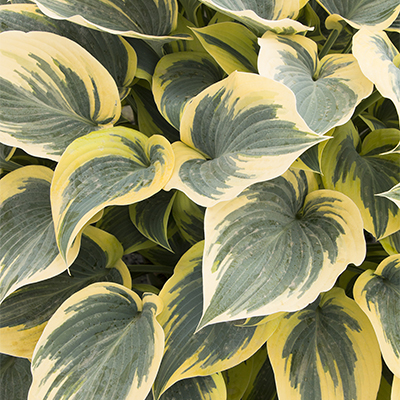
First Frost Plantain Lily
Zone: 4 – 9
Up to 16 in. tall, 36 in. wide
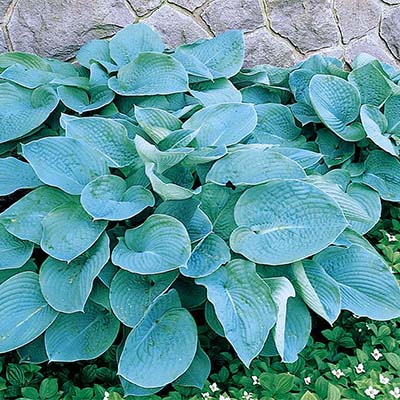
Eola Sapphire Plantain Lily
Zone: 3 – 9
Up to 3 ft. tall, 4 ft. wide
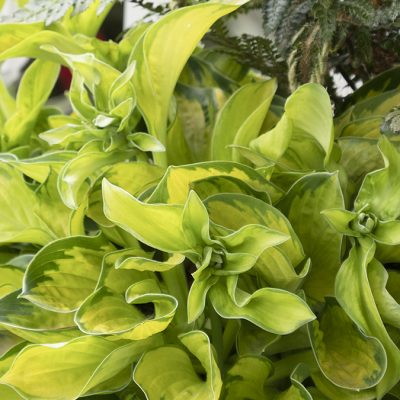
Rainforest Sunrise Hosta
Zone: 3 – 9
Up to 8 in. tall, 16 in. wide
What's With the Blues?
Finding a truly blue-hued flower is the stuff of legend. Although plenty of hostas fill that garden color yen with true-blue foliage. How? It’s all in the genes.
Here's the science: The genetics of original species hostas allows them to make the special 'crystalline wax' layer. It shows those desirable blue hues. That waxy layer is found in the cuticle which is the topmost layer of the epidermis. It appears as a shiny film or a glaucous outer covering, which gives it the gray-blue appearance. Pretty cool, right?
Can that wax melt? You bet. Though some varieties are less impacted (such as Abiqua Drinking Gourd) wax can come off due to rainfall. It can also come off with wind and watering, but heat and sun are the most prominent cause of damage. So, plant blue hostas out of direct sun. Here are three brilliant blues.
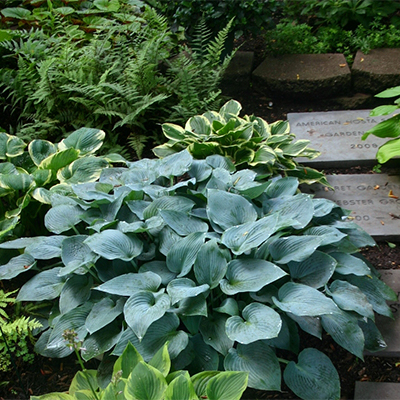
Hadspen Blue Plantain Lily
Zone: 4 – 9
Up to 12 in. tall, 20 in. wide
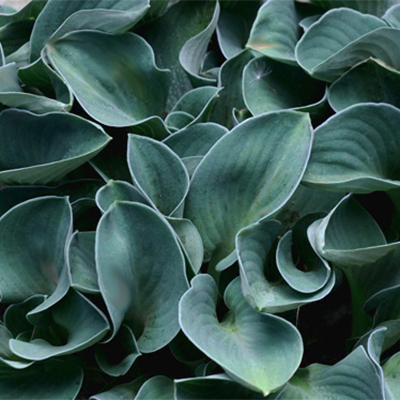
Blue Mouse Ears Hosta
Zone: 3 – 8
Up to 7 in. tall, 12 in. wide
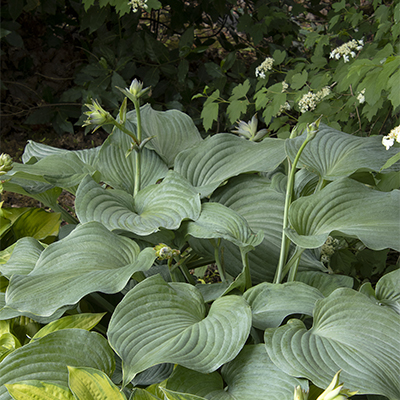
Blue Angel Plantain Lily
Zone: 3 – 9
Up to 2 ft. tall, 4 ft. wide
Let's Talk About Slugs
“I love slugs,” said no one ever. The recipe of warm days + ample moisture + tasty hosta leaves are like ringing the dinner bell. There are many homegrown deterrents from pine needles and slug traps to copper pennies and beer trays. The best place to start is by eliminating places slugs can hide. Rake up fallen leaves. And, think about planting varieties with thicker, heavily textured leaves that are more slug resistant.
Finally, consider this–slugs are an important part of a complex food chain. Having them in your garden encourages visits from valuable critters such as birds, beetles, toads and slow worms. All of which will eat large quantities of slugs or snails. And also stay to contribute to the overall health of your garden.
Here are three hostas that are more resistant to damage by slugs (of course, a hungry slug…)
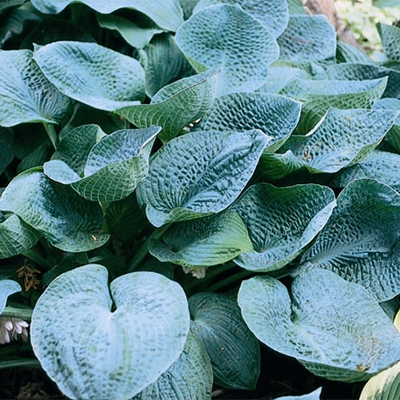
Big Daddy Plantain Lily
Zone: 4 – 8
Up to 2 ft. tall, 4 ft. wide
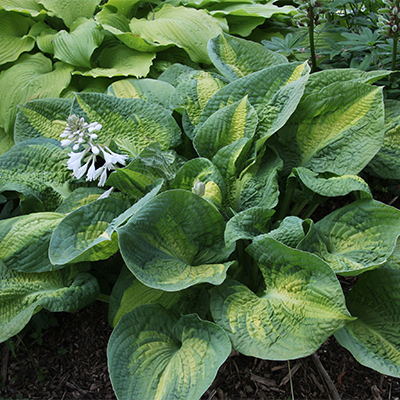
Brother Stefan Hosta
Zone: 3 – 7
Up to 2 ft. tall, 3 ft. wide
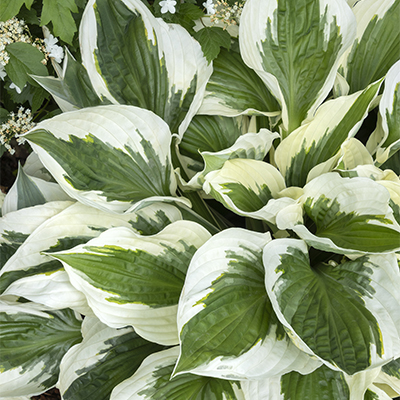
Patriot Plantain Lily
Zone: 4 – 8
Up to 20″ tall, 30″ wide
Fragrant? Edible? Flowers?
Let’s start with fragrance (who doesn’t want more of that in the garden!). Some, but not all hostas have very fragrant flowers. Especially in the evening when they emit a scent that's been said to be a cross between daffodil and lily. Fragrant Bouquet Hosta is one to try.
Are hosta leave edible? Well, yes and they’re quite popular in places like Japan. But here's the thing. We're talking about those very tender new leaves that you see shooting up and unfurling early in the season. Rather than those mature ones you might pluck from the summer garden. (Always harvest leaves from plants that have NOT been treated with inorganic chemicals.) Flowers are also edible.
When it comes to the tall flower stalks there are two teams–the snippers and the keepers. To some the flowers are just plain not pretty. While others (like yours truly) love the airy blooms and the spiky stalks. Where do you land on this one? Let us know in comments.
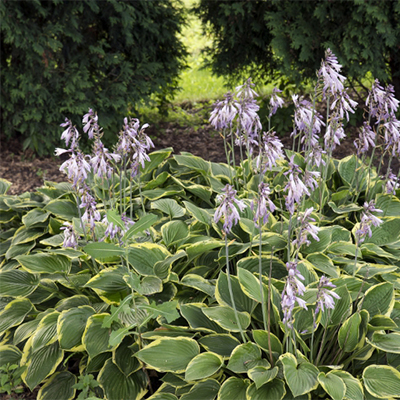
Fragrant Bouquet Hosta
Zone: 3 – 8
Up to 20 in. tall, 36 in. wide
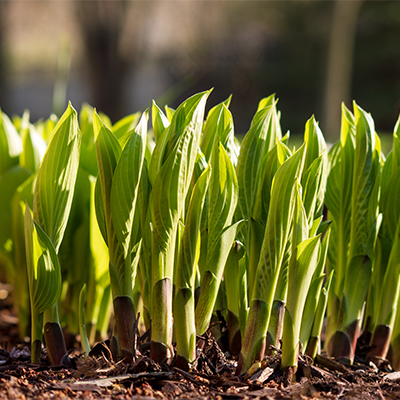
Newly Emerging Hosta Leaves
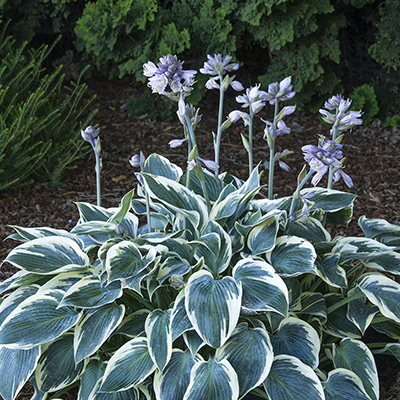
Frosty Ribbons® Hosta
Zone: 4 – 8
Up to 24 in. tall, 36 in. wide
There's One for Every Size Garden
Hostas range from petite to enormous, so there’s probably one for every shady spot in your garden. Smaller varieties look great in mixed containers or as a colorful leafy border for a bed. Even as massed at the edge of the canopy of a shade tree or in an island bed. The larger ones are statement makers. They need plenty of space around them to really appreciate the scale and their leafy goodness. Some like to mass one variety, others prefer a hosta collection. That’s how versatile this little herbaceous perennial can be.
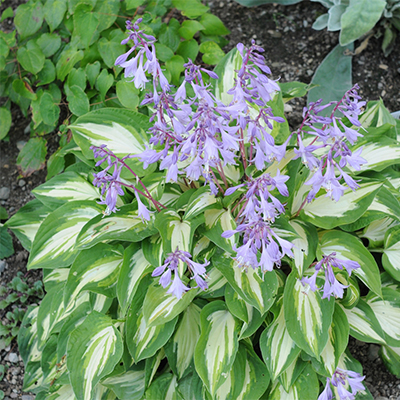
Fantasy Island Plantain Lily
(Zone: 3 – 9)
Up to 10″ tall, 15″ wide
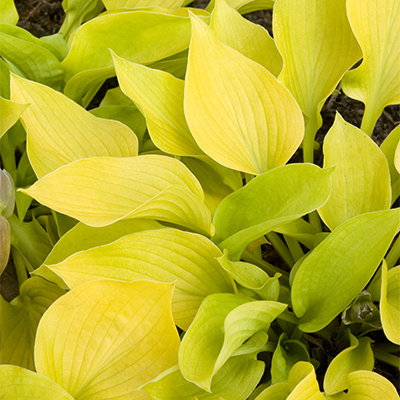
Fantasy Island Plantain Lily
(Zone: 3 – 9)
Up to 10″ tall, 15″ wide
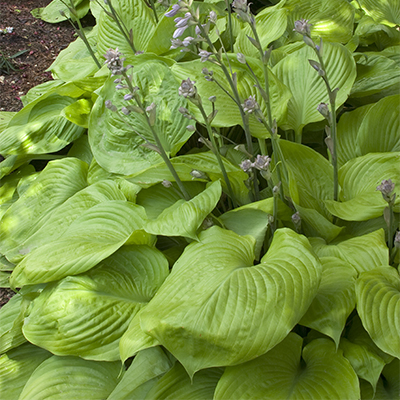
Sum and Substance Hosta
(Zone: 4 – 9)
Up to 3 ft. tall, 6 ft. wide
So, that’s just a bit to know about this beloved, useful shade perennial. Do you have a favorite variety? Share in comments below.
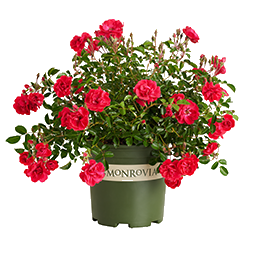
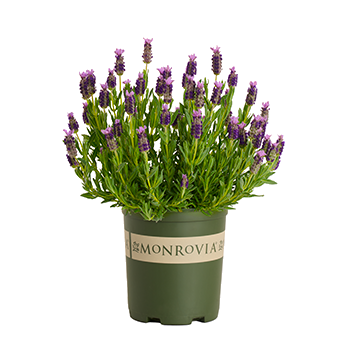
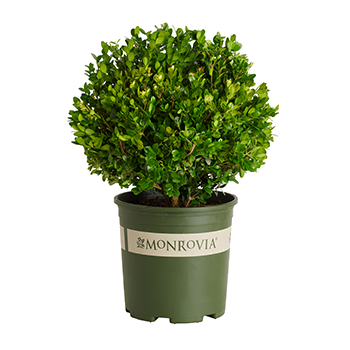


Please login to comment.
Don't have an account?
Sign Up for free